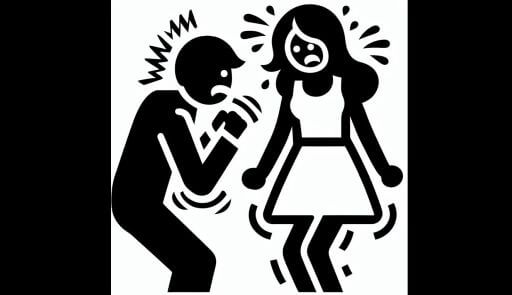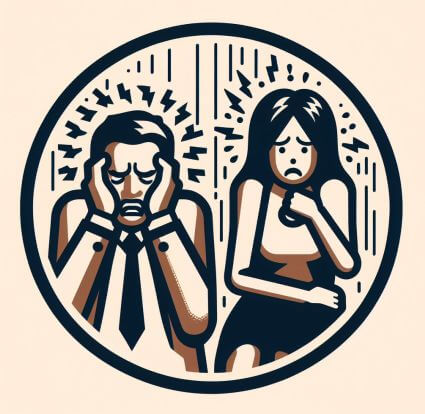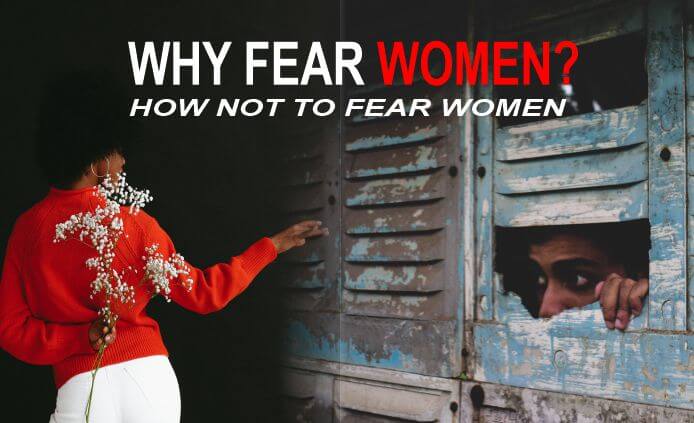Last updated on July 15th, 2024 at 04:55 pm
Gynophobia, the fear of women explained. Learn the impact, causes, and how to overcome this psychological condition for healthier relationships.
At first, I was curious to know why someone would have a phobia for women, especially men.
Do women have some wicked powers that put them on the same category with the devil, or do they have venom like the puff adder that men would fear them?
Gynophobia is a psychological condition that can manifest in various ways, impacting personal, social, and professional interactions.
This article aims to explore the various aspects of phobia for women, including its origins, symptoms, impact on individuals and society, potential causes, and available treatment options.
Related: A Peak into the Inner Lives of Women
Table of Contents
- Gynophobia Meaning
- How Rare is Phobia for Women?
- Gynophobia vs Misogyny
- Gynophobia Symptoms
- What Causes Gynophobia?
- Impact of Gynophobia
- Overcoming Phobia for Women
- Worse Scenario for Gynophobia
- Complications of Fear of Women
- Frequently Asked Questions
- Conclusion
Gynophobia Meaning

What is Gynophobia?
The fear of women is diagnosed as a specific phobia, a type of anxiety disorder characterized by an irrational and persistent fear of women.
Men experiencing this condition may exhibit exceptional discomfort, anxiety, or panic when in the presence of women or even the mere thought of interacting with them.
The fear may manifest in various contexts, such as in social settings, professional environments, or intimate relationships.
Suggested: Etiquette and Manners for Ladies
How Rare is Phobia for Women?
While it is not as widely discussed as other phobias, is not as rare as one might think.
Its prevalence may be underestimated due to societal stigmas and the private nature of this fear.
Many people may experience varying degrees of the fear of woman, from mild discomfort to severe aversion.
However, due to the sensitive nature of the topic, many cases likely go unreported or undiagnosed.
Increased awareness and open discussions about the issue can help shed light on its prevalence and provide support for those affected by this fear.
Also Read: Femininity vs Feminism
Gynophobia vs Misogyny
As we have learned throughout this article, gynophobia is an irrational fear towards women, often stemming from psychological or social factors.
It is characterized by anxiety, discomfort, or a desire to avoid interactions with women.
On the other hand, misogyny is a deep-rooted hatred, contempt, or prejudice against women based on their gender.
It reveals itself in various forms, such as discrimination, objectification, or even violence towards women.
While phobia for women is a fear or aversion, misogyny is a more intense and systematic manifestation of sexism, perpetuating inequality and oppression.
Both gynophobia and misogyny negatively impact women and contribute to a gendered power imbalance in society.
Related: How to Cultivate Inner Beauty
Gynophobia Symptoms

The symptoms of the fear of women can vary from mild to severe, depending on the individual.
Common symptoms may include:
- An intense and unreasonable fear of women that may obstruct daily life activities.
- Avoidance of situations or places where women are present or may be encountered.
- Heightened anxiety, panic attacks, or strong feelings of distress when around women.
- Physical symptoms such as rapid heartbeat, sweating, trembling, shortness of breath, or nausea.
- Negative and irrational thoughts about women, leading to biased beliefs or judgments.
Related: Embracing Femininity
What Causes Gynophobia?

The origins of gynophobia can be multifactorial. However, identifying specific causes can be challenging due to the complex interplay between biological, psychological, social, and cultural influences.
Some possible contributing factors include:
1. Early Childhood Experiences
Negative or traumatic interactions with female figures in early childhood, such as a domineering mother or witnessing parental conflict, can lead to gynophobia.
These experiences shape a child’s perception of women as threatening, encouraging negative beliefs and attitudes.
Exposure to gender stereotypes and societal biases further contributes to gynophobic tendencies.
2. Cultural and Societal Expectations
Cultural and societal expectations, often rooted in traditional gender roles and stereotypes, can contribute to the fear of women.
Pressures to conform to specific ideals of masculinity and femininity may instill fear or aversion towards women, shaping negative attitudes and beliefs.
3. Underlying Psychological Conditions
Underlying psychological conditions, such as anxiety disorders or past trauma, can contribute to this condition.
Addressing these psychological factors through therapy and support is crucial in overcoming the problem and encouraging healthy relationships with women.
4. Learned behaviours
Observing gynophobic behaviour from family members, peers, or media can inadvertently influence the perception of women.
Observing and internalizing fear or aversion towards women from family members or peers can also shape your attitudes and beliefs.
These learned behaviours may lead to the development of gynophobic tendencies, impacting future interactions with women.
Related: Everyday Challenges of Women
Impact of Gynophobia
The fear of women can impact both on individuals and society.
Here are the effects:
Individuals
Gynophobia can significantly impact the lives of those who experience it and those around them.
It may hinder personal relationships, career opportunities, and overall mental well-being.
Avoidance behaviours can lead to isolation and social withdrawal, affecting the development of new connections and meaningful partnerships.
In the workplace, it can limit professional growth.
The unease and anxiety associated with interacting with women may cause male sufferers to avoid collaborating or consulting with female colleagues, leading to reduced productivity and missed opportunities for teamwork.
Social Interactions
The fear of women can also impact social interactions more broadly.
Individuals may feel uncomfortable or anxious in social situations that involve women, such as parties, gatherings, or group activities.
This fear can lead to avoidance of social situations or withdrawal from social activities altogether.
It may hinder you from participating fully in social life, making it harder to connect with others and engage in meaningful social interactions.
Related: Reasons Why Women Love Drama
Professional Environment
It can also have an impact on your professional life.
In workplace settings, the fear of woman can affect the ability to work effectively with female colleagues, bosses, or clients.
This fear can lead to reduced communication, or a lack of collaboration with women, which can hinder career progression and limit the opportunities for professional growth.
It can also create a hostile or uncomfortable work environment if not addressed, potentially leading to conflicts or strained relationships with female coworkers.
Impact on Society
The fear of women extends beyond the individual level and can hold adverse consequences for society as a whole.
By perpetuating stereotypes and gender-based discrimination, it reinforces inequality and hinder progress towards gender equality.
The prevalence of this illness within certain communities or societies can contribute to the infringement of women’s rights, restrictions on their education and career possibilities, and normalization of gender-based violence.
Addressing fear of women is crucial for fostering a more inclusive and equitable society.
Overcoming Phobia for Women

Phobia for women, like any other phobia, is treatable.
Seeking professional help from mental health providers, such as psychologists or psychiatrists, is crucial.
Several treatment approaches can be effective in managing and overcoming the fear of women:
Here are three main ways to overcome phobia for women:
1. Education and Awareness
One important step is to gain knowledge about women, their experiences, and their role in society.
By educating yourself about gender equality, women’s rights, and understanding that women are diverse individuals, it can help debunk any stereotypes or misconceptions that may contribute to the fear.
This can be achieved through reading books, articles, or attending workshops and seminars that focus on gender education and awareness.
2. Therapy and Support
Therapy can be an effective approach if you are struggling with phobia for women.
Working with a qualified therapist can help uncover the root causes of the fear and address any underlying issues or traumas that may contribute to it.
Here are some therapies that can be of help:
- Cognitive-behavioral Therapy (CBT): CBT aims to identify and challenge negative thoughts and beliefs about women, replacing them with more rational and balanced thinking patterns.
- Exposure Therapy: Gradual exposure to women and situations triggering fear allows individuals to confront their anxieties and gradually reduce avoidance behaviors.
- Support Groups and Counseling: Group therapy or individual counseling can provide a safe space for individuals to share their experiences, receive support, and gain insights into their phobia for women.
- Medication: In severe cases, a combination of therapy and medications, such as anti-anxiety medications or selective serotonin reuptake inhibitors (SSRIs), may be recommended.
3. Building Positive Relationships with Women
Developing positive relationships with women is crucial in overcoming gynophobia.
This can begin by actively seeking opportunities to interact with women in various settings, such as work or social activities.
Taking small steps and gradually exposing oneself to situations that trigger fear or discomfort can help desensitize the anxious response.
It is important to approach these interactions with an open mind, empathy, and respect.
Building genuine friendships and cultivating healthy relationships with women can help challenge negative beliefs and foster understanding and acceptance.
Worse Scenario for Gynophobia
A worse scenario for someone with gynophobia might involve extreme anxiety or panic attacks in situations where they have to interact with women.
This could result in significant impairment in their personal and professional life.
They may struggle to maintain relationships, experience difficulties at work or school, and have limited social interactions due to their fear.
In the worst case, they may become isolated and suffer from depression or other mental health issues.
The fear may also escalate to an extent where they avoid any exposure to women, even in media or public spaces, which can severely limit their everyday activities and experiences.
Complications of Fear of Women
Negative Self-perception: It can lead to negative self-perception and self-doubt. The fear may create a belief that there is something inherently wrong or dangerous about women, which can perpetuate feelings of unease or mistrust.
Social Isolation: Phobia for women may lead to social isolation as individuals may avoid situations or places where they may encounter women.
Professional Setbacks: If the fear of women is severe, it can affect a person’s work life with difficulties interacting with female colleagues, supervisors, or clients.
Relationship Difficulties: Fear of women can make it challenging to form and maintain healthy relationships with women.
Frequently Asked Questions
What is the fear of women gynophobia?
Phobia for women is the fear or aversion towards women, often stemming from psychological, societal, or cultural factors.
What causes the fear of women?
The fear of women can be caused by early childhood experiences, societal expectations, and underlying psychological conditions.
What is it called when you are afraid of women?
The fear of women or phobia for women, a condition that can lead to discomfort or aversion towards interactions with women.
What is the male version of gynophobia?
The male version is androphobia, which is the fear or aversion towards men.
Conclusion
Gynophobia is a complex psychological condition characterized by a strong fear or aversion to women.
It can have serious effect on people and society, hindering personal relationships, professional growth, and reinforcing gender-based inequalities.
Understanding the causes as we have explained in this article and seeking appropriate treatment options can help you overcome the condition.
References:
- Gynophobia (Fear of Women) – Healthgrades
- Gynophobia: An Overview On The Fear of Women
- Gynophobia: What Is It, triggers, Symptoms, and Treatment
- https://www.mentalhealth.com/disorder/specific-phobia/gynophobia
Pious Clements is the insightful voice behind "The Conducts of Life" blog, where he writes about life ethics, self-development, life mastery, and the dynamics of people and society.
With a profound understanding of human behaviuor and societal dynamics, Pious offers thought-provoking perspectives on ethical living and personal growth.
Through engaging narratives and astute observations, he inspires readers to navigate life's complexities with wisdom and integrity, encouraging a deeper understanding of the human experience and our place within society.

